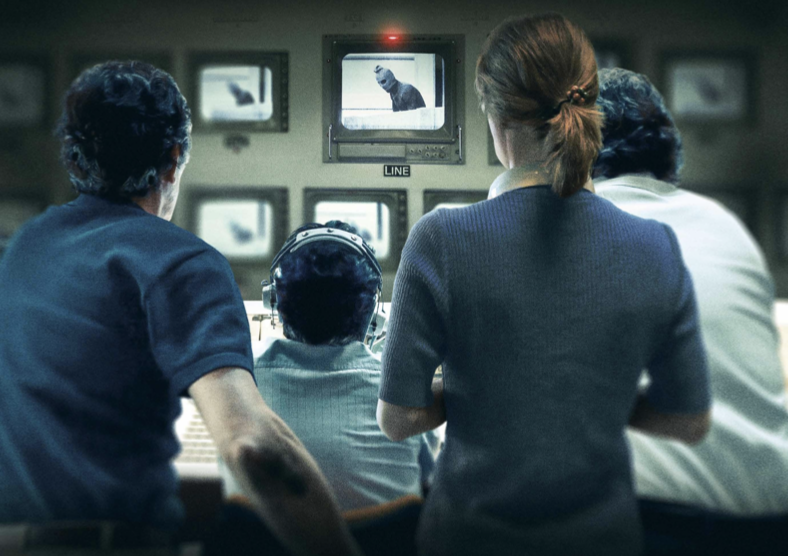
September 5
November 27, 2024 / Kevin Ward — ★★★★
September 5 opens with a hum of organized chaos in the ABC Sports control room, where the production crew is wrapping up another day of Olympic coverage. Peter Sarsgaard, portraying the unflappable Roone Arledge, stands at the helm, calmly overseeing the broadcast. Camera directions are called out with military precision, the room alive with urgency: “Camera 2, push in. Prep 2. Fade to 2. Camera 6, get me a close-up. Prep 6. Fade to 6.”
The crew moves in sync like a well-oiled machine, the tension of live production palpable in every frame. Tim Fehlbaum, the film’s director, doesn’t just tell a story—he immerses you in the intricate workings of live television. We see how captions are superimposed and subtitles filmed in real-time, offering a behind-the-scenes glimpse into the technical ballet that brings live broadcasts to millions. This meticulous attention to detail sets the stage for what will come as the stakes climb from routine sports coverage to life-and-death decisions when a global tragedy unfolds mere yards away.
The breaking news arrives like a gut punch. Just a hundred yards from their control room, the athletes’ village becomes the epicenter of a crisis: eight members of the Palestinian group Black September have taken eleven Israeli athletes hostage. The world’s focus shifts from the games to an unfolding nightmare. Tim Fehlbaum anchors the story in the control room, crafting a claustrophobic yet electrifying drama that delves into the dual pressures of technology and morality. The early focus on the production process—how camera angles are chosen and captions meticulously composed—makes the ethical dilemmas that follow even more visceral. When tragedy collides with opportunity, the crew must grapple with how far to push for ratings and how to balance human decency with journalistic ambition.
Adding to the tension is the absence of the “A-team” production crew, leaving Arledge to guide Geoffrey Mason (played by John Magaro) through his first day of Olympic coverage as producer. Eager to seize the moment and prove his mettle, Mason quickly finds himself in over his head, wrestling with the moral weight of live broadcasting such a horrific event. Together, he and Arledge face questions that feel as relevant today as they did in 1972: Where is the line between informing the public and exploiting a tragedy? When does the lens of a camera become a weapon or a shield?
Leonie Benesch, as German translator Marianne Gebhardt, delivers one of the film’s standout performances. Marianne isn’t just a linguistic bridge but a window into Germany’s post-war psyche, her nervous energy reflecting the nation’s uncertainty in handling the world’s gaze during such a crisis. Fresh off her role in The Teacher’s Lounge, Benesch imbues Marianne with quiet strength, deftly explaining cultural nuances to Arledge and Mason, such as why Germany’s police presence appears minimal and how national history looms over their response. Her presence grounds the film in a broader context, highlighting not just the crisis but the political and cultural pressures surrounding it.
The control room becomes a crucible where ambition, technology, and ethics collide. Tim Fehlbaum uses the confined setting to ratchet up the tension, making every decision feel monumental. As Mason demands tighter shots on the hostage-takers’ balcony, a production assistant jokingly quips, “Okay, Kubrick.” But the humor is fleeting—Mason begins to realize the unprecedented power of live TV in shaping the narrative. They are no longer passive observers but active participants, their broadcast influencing events in real-time.
One of Fehlbaum’s most effective tools is his use of archival footage, seamlessly blending real and dramatized elements to immerse the audience in the raw reality of the crisis. The juxtaposition of grainy, historical broadcasts with the fictionalized control room scenes creates a haunting immediacy, as if we’re alongside the crew, experiencing the escalating nightmare.
Through its vivid recreation of the control room dynamics, September 5 offers an unflinching look at the intersection of media, power, and human tragedy. Tim Fehlbaum crafts a gripping and thought-provoking story anchored by stellar performances from Peter Sarsgaard, John Magaro, and Leonie Benesch. I rather loved this. It’s a biting critique of sensationalism in media, exposing a model where ratings, drama, and clicks often outweigh humanity and even truth. The moral dilemmas at play here are as timely as ever, inviting reflection on the role of media in shaping both perception and events.
In one of the closing moments, Mason tries to console Gebhardt, apologizing for putting her at the front lines of a tragedy and how frightening it must have been. She looks at him, dejected. “It was fine. I was with hundreds of other people. We were all there just trying to take a picture of it.” Her words cut to the heart of the film’s critique, exposing the collective complicity in turning suffering into spectacle. Mason nods quietly, acknowledging the uncomfortable truth. “So, I’ll see you tomorrow?” he asks, the simplicity of his question encapsulating the uneasy blend of resignation and resolve.
The real-life Munich hostage crisis was a defining moment in modern media. It was one of the first times a tragedy of this magnitude was covered live, bringing the raw terror of the events directly into viewers’ homes. Tim Fehlbaum captures this historic turning point by anchoring the film in the ABC Sports control room, transforming it into a claustrophobic stage for moral and ethical dilemmas. The contrast between the crew’s initial excitement over a ratings spike and the grim reality of their broadcasting creates a sharp critique of sensationalism. It forces the audience to confront the uncomfortable truth about how media operates in crisis—a question that resonates just as strongly in today’s era of 24/7 news cycles.
Director: Tim Fehlbaum
Screenplay: Tim Fehlbaum, Moritz Binder, Alex David
Cast: Peter Sarsgaard, John Magaro, Ben Chaplin, Leonie Benesch
Producer: John Ira Palmer, Thomas Wöbke, Philipp Trauer, John Wildermuth, Rüdiger Böss, Constanze Guttmann, Mark Nolting, Sean Penn, Christian Reitz
Runtime: 91 minutes
Rated: R

